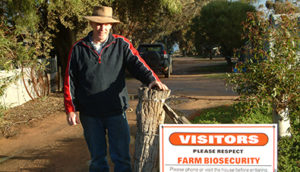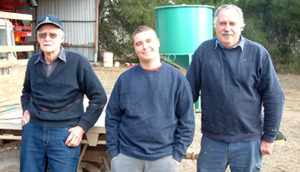Read the latest information on
Foot-and-mouth disease
Farmers Rodney and Debbie Pohlner of Glenlee, north-west of Dimboola in the Wimmera region, and the Schwedes family, also of Glenlee, were finalists in the plant biosecurity category of the Australian Farmer of the Year Awards.
 Rodney Pohlner is a fourth generation farmer who owns and manages a 600 hectare property growing cereal oilseeds and pulses on rotation.
Rodney Pohlner is a fourth generation farmer who owns and manages a 600 hectare property growing cereal oilseeds and pulses on rotation.
Rodney admits he has always been fussy. “I was brought up being told that what we now call biosecurity was good farming. So for me, it’s a habit of a lifetime,” he said.
Rodney had a number of drivers to implement on-farm biosecurity practices, including control of weeds, financial returns, and saving time and effort in the long run. With the family business built up over generations at stake, Rodney understands how hard it is to live with and manage pests and weeds.
“Prevention is definitely the best strategy for me,” he said.
 The other crop finalists were the Schwedes, three generations of farmers who own and jointly manage a 1,660 hectare property.
The other crop finalists were the Schwedes, three generations of farmers who own and jointly manage a 1,660 hectare property.
Harry Schwedes, who is 85-years-old, has been farming for 70 of those years.
His son Greg and grandson Adam are enthusiastic farmers who see a bright future for themselves as grain growers.
To ensure a successful future, all three are open to continued learning and emerging opportunities.
The combination of experience, the use of high-tech equipment and implementation of the latest research findings are paying off for them.
Through their involvement in various technical and community groups, the Schwedes’ have been exposed to new thinking and are ‘early adopters’ of new ideas.
They also host National Variety Trials, which measure the performance of recently released grain and field crop varieties at sites across Australia.
“We retain stubble and sow inter row,” said Greg Schwedes.
“Both the stubble and minimum number of passes helps reduce soil erosion, particularly in the lighter country.”
The use of a precision GPS system for sowing and spraying not only improves efficiencies in their operation, but also allows them to sow next year’s crop away from last year’s stubble row to minimise the impact of disease.
Grain storage and pest control became priorities for both finalists because they wanted to gain access to alternative markets, and to increase their selling price.
“If insects are destroyed, there is no trouble selling grain at the receival point,” said Greg Schwedes.
Judges were impressed by the thorough integration of biosecurity practices into everyday activities. They noted that both finalists are also motivated and willing to improve on practices to suit their situation.
Simple biosecurity related actions – like having a dedicated parking area, cleaning vehicles at a wash down area and inspecting crops – have been standard practices for years and are a part of daily life.
On both farms, the whole family and farm visitors are involved as the success of their enterprise relies on everybody sticking to the biosecurity rules.
“It does take a little extra time out of the day to ensure they stick to the rules, but we can’t afford not to,” said Rodney Pohlner. “Who wants to be accused of spreading weeds, snails or diseases to neighbours?”
Both families have a clear conscience knowing they are not taking any infected material off their property and have peace of mind knowing nothing contaminated is coming onto their property.